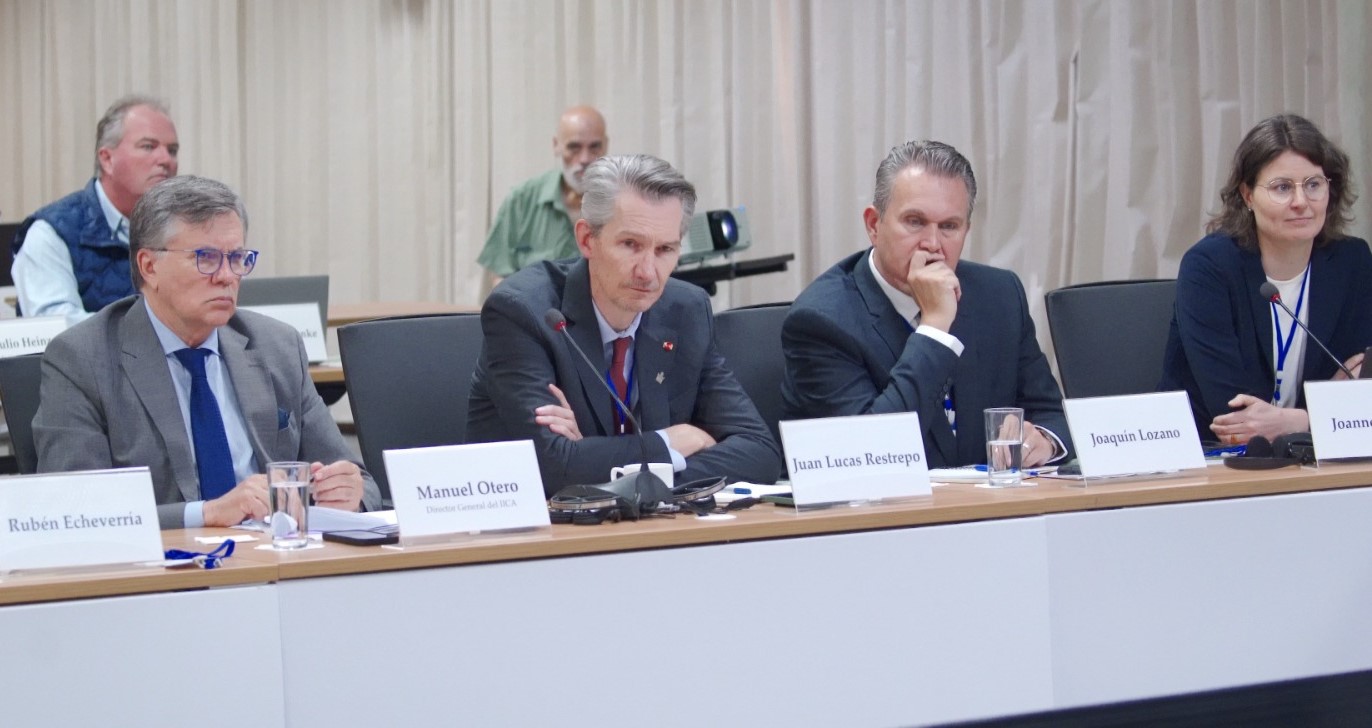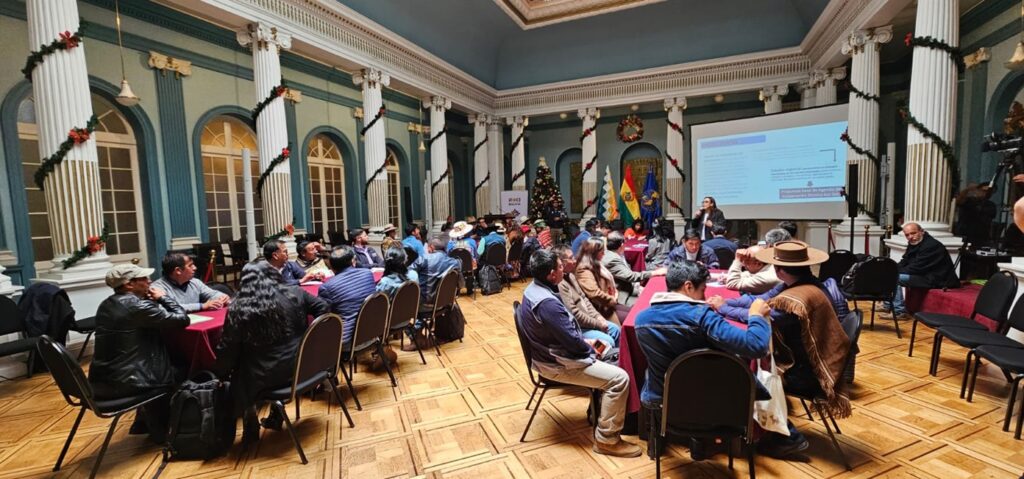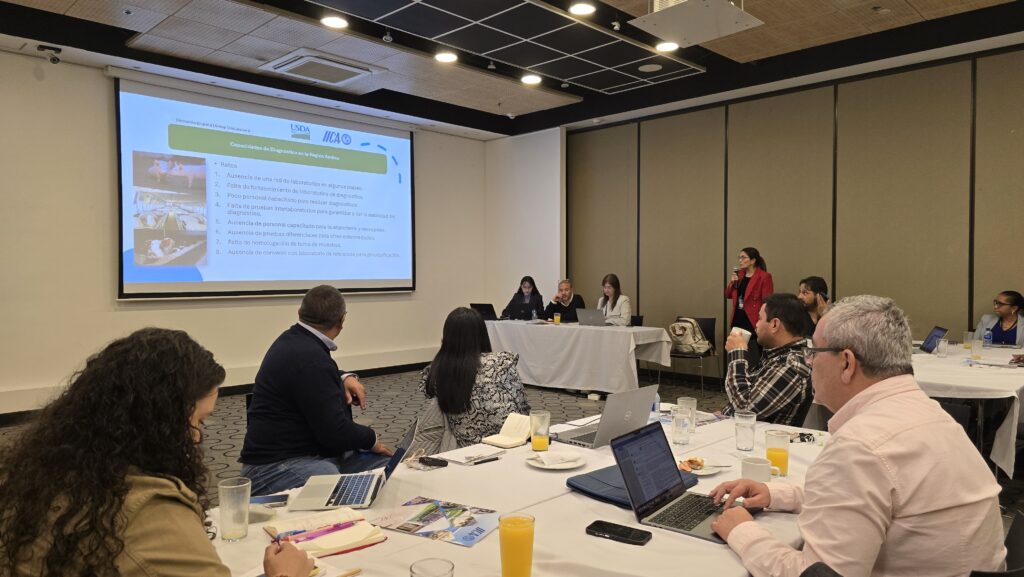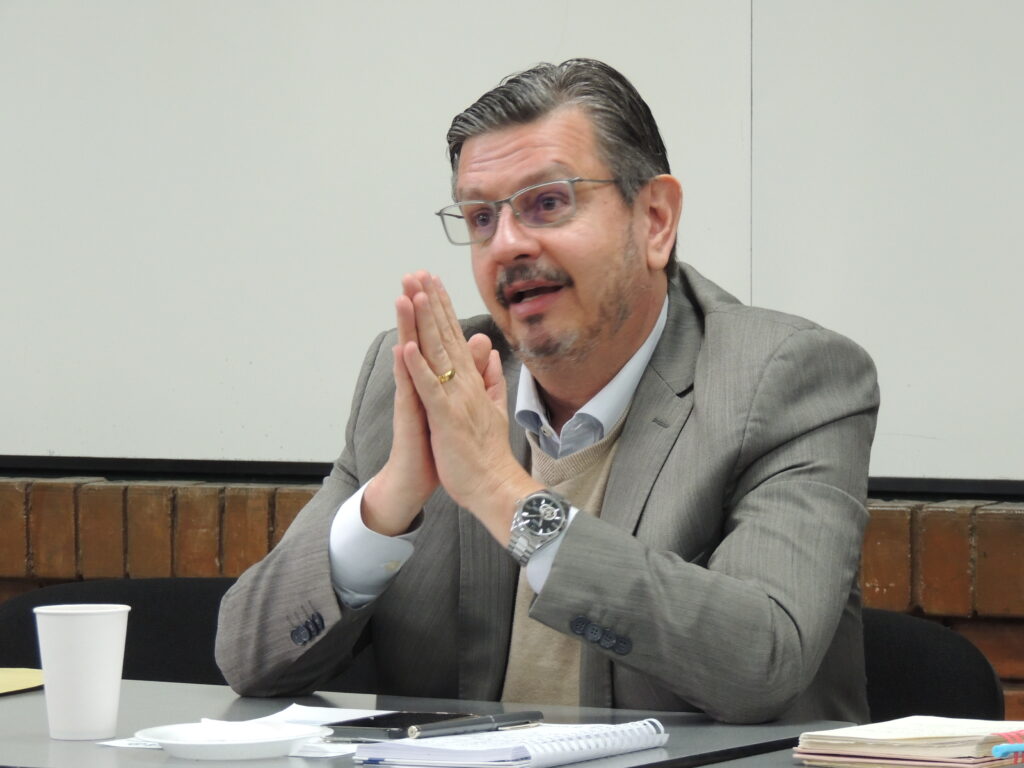IICA, CGIAR y Banco Mundial organizaron en Costa Rica un diálogo entre iniciativas regionales de innovación agropecuaria, los sistemas nacionales de innovación de las Américas y otros actores del sector privado, para discutir cómo se puede aumentar la investigación y la transferencia de conocimientos hacia los productores del hemisferio.

San José, 8 de mayo, 2023 (IICA). El Instituto Interamericano de Cooperación para la Agricultura (IICA) reforzará su rol de enlace con los mecanismos regionales de innovación, tecnología e investigación agropecuaria de las Américas, para lo que ampliará el diálogo y el trabajo conjunto con esos programas, apuntando a acompañar la transformación de los sistemas agroalimentarios de la región con el apoyo del CGIAR y el Banco Mundial.
Con este compromiso del Director General del Instituto, Manuel Otero, concluyó el Diálogo regional sobre ciencia, tecnología e innovación en los sistemas agroalimentarios de América Latina y el Caribe, realizado en Costa Rica y que convocó a más de 100 autoridades y expertos de la Fundación Bill & Melinda Gates, el Consejo Argentino para las Relaciones Internacionales (CARI), los institutos nacionales de investigación agropecuaria de diversos países de las Américas y otras organizaciones internacionales.
Su realización estuvo a cargo del IICA, el Banco Mundial y CGIAR, alianza global de investigación para un futuro con seguridad alimentaria, que busca transformar los sistemas alimentarios, terrestres e hídricos ante la crisis climática.
“Quisiera asumir compromisos; reforzar el apoyo al PROCISUR (Programa Cooperativo para el Desarrollo Tecnológico Agroalimentario y Agroindustrial del Cono Sur), al PROCINORTE (Programa Cooperativo de Investigación y Tecnología Agrícola para la Región Norte), vamos por más, este tema de la construcción de puentes es fundamental para no estar como enclaves aislados y avanzar en materia de los sistemas de innovación”, indicó Otero al cierre del diálogo.
Asimismo, ratificó el respaldo del IICA al Fondo Regional de Tecnología Agropecuaria (FONTAGRO). “Aspiramos a que sea un mecanismo de financiamiento renovado, con más recursos para financiar temas planteados en el diálogo”, acotó.
En materia de políticas de ciencia y tecnología, Otero ofreció gestionar un espacio en el Observatorio de Políticas Públicas para los Sistemas Agroalimentarios (OPSAa), lanzado por el Instituto en el 2022, para destacar los avances en normativa sobre innovación, ciencia y tecnología agrícola.
Además, por el papel de la ciencia, la tecnología y la innovación en la modernización y el fortalecimiento de los sistemas agroalimentarios de la región, su rol frente a los desafíos actuales -como la sostenibilidad, el cambio climático y la necesidad de la seguridad alimentaria- y la búsqueda de financiamiento, el Director General llevará el tema al Comité Ejecutivo del IICA, en julio; y a la Junta Interamericana de Agricultura (JIA), en octubre, solo semanas antes de la Conferencia de las Naciones Unidas sobre Cambio Climático (COP 28) que se realizará entre noviembre y diciembre en Emiratos Árabes Unidos.
“Tenemos que generar señales claras de que hay cohesión en la región, enfatizando que los países no pueden actuar de manera aislada y que el tema de ciencia e innovación en la agricultura es fundamental para enfrentar los grandes retos actuales, como el cambio climático. En esas reuniones vamos a hacer un nuevo llamado a la acción colectiva y a la necesidad de crear una alianza continental para garantizar la seguridad alimentaria y el desarrollo sostenible”, agregó.
El Director General del IICA también enumeró algunos de los retos pendientes en torno a la innovación, ciencia y tecnología en la región.
“Hace falta una red de instituciones vinculadas a la agricultura tropical, la institucionalidad para este tipo de agricultura se debe fortalecer, y hay que sistematizar el pensamiento prospectivo pues la agricultura del futuro trae muchísimos cambios. El IICA quiere sumarse a esta reflexión, y también a una eventual plataforma sobre biociencias vinculada sobre genética”, detalló Otero.
Prioridades en innovación, ciencia y tecnología
Durante el diálogo en Costa Rica, cuyo objetivo fue reinstalar en la agenda internacional temas estratégicos para el fortalecimiento y transformación de los sistemas de innovación e identificar potenciales áreas de trabajo conjunto, alineadas a las prioridades nacionales y regionales en las Américas, hubo un consenso de que es clave entender las redes de innovación existentes y las políticas públicas que definan el ecosistema de innovación.
Los participantes coincidieron también en que es fundamental construir agendas estratégicas de investigación y desarrollo compartidas por los institutos nacionales de investigación y tecnología agropecuaria de los países de las Américas y los organismos internacionales como el CGIAR, y que se considere el rol de esas organizaciones dentro del ecosistema de innovación.
Además, se concluyó que es crucial fortalecer la institucionalidad pública, incrementando las capacidades institucionales, humanas, de servicios de apoyo e incentivos; avanzar en posibles cambios normativos y en las formas de financiamiento que faciliten y promuevan el papel de nuevos actores públicos y privados, así como enfrentar los déficits existentes en los niveles de inversión pública y privada para la generación de los bienes públicos.
“Estamos llamados a hacer una participación muy activa y coordinada para construir un ecosistema que sea cada vez más adecuado para la medición tecnológica de los sistemas agroalimentarios”, complementó Joaquín Lozano, Director Regional para América Latina y el Caribe del CGIAR.
“Debemos seguir uniendo voces, actores, movilizar más recursos para invertir en ciencia, tecnología e innovación en la región; esto es un trabajo de todos y el CGIAR acompañará este proceso de fortalecer la ciencia, investigación e innovación de los sistemas agroalimentarios”, añadió.
Para lograr lo anterior se planteó como prioridad identificar cuáles son los nuevos bienes públicos tecnológicos prioritarios para la región y construir agendas de trabajo e investigación necesarias para desarrollarlos, las cuales deben ser consensuadas entre todas las instituciones públicas nacionales, los organismos internacionales y el sector privado.
Los participantes en el diálogo también citaron que se requiere repensar la organización institucional en innovación, ciencia y tecnología existente, con un énfasis en su agilidad operativa y coordinación con el sector privado; así como avanzar en aspectos de financiamiento, políticas públicas e intercambio de experiencias entre los sistemas nacionales e internacionales de innovación agropecuaria.
“Esta agenda es única e importante, nos permite caracterizarnos por una visión a muy largo plazo, clave para el sector y para el desarrollo, inversión y políticas. Hay un grado de coincidencia entre todas nuestras instituciones de continuar con los diálogos para perfeccionar objetivos, identificar fuentes de financiación adecuadas y seguir perfeccionando, avanzando en la innovación agrícola”, concluyó Joanne Gaskell, economista agrícola senior del Banco Mundial.
Más información:
Gerencia de Comunicación Institucional
comunicacion.institucional@iica.int










